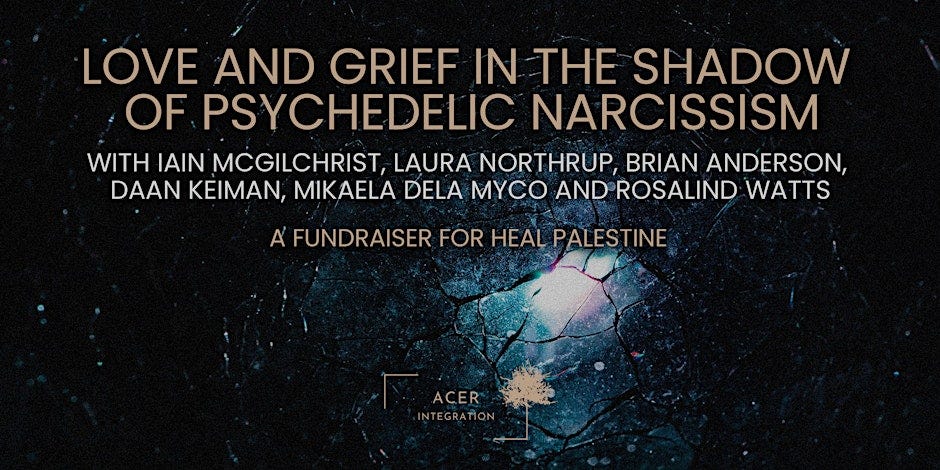If you liked reading this, feel free to click the ❤️ button on this post so more people can discover it on Substack 🙏
I write Toxic Workplace Survival Guy because toxic workplaces make me angry. I want to help as many people as possible do as I did: survive long enough to emerge with my mental health, dignity and career intact, on my own terms. A big thank-you to all those who’ve become paid subscribers.
Live Event: I’m delighted to share that I’ll be making my first live appearance as Toxic Workplace Survival Guy next month, at Love and Grief in the Shadow of Psychedelic Narcissism, an online event hosted by Dr Rosalind Watts’ Acer Integration community on Thursday, 23 May 19:00-21:30 BST. Tickets here.
Survival Tool#19: Protect Your Partner
If you’re stuck (for now) in a toxic workplace, your relationship will suffer.
At first, neither of you will realise what’s happening.
But the cumulative impact of the workplace injustice, frustration and diminishment you suffer on a daily basis will inevitably begin to corrode your capacity for intimacy.
As we explored in Survival Tool#15, a toxic workplace is constantly triggering our nervous system.
That means we’ll either:
Enter an exhausting state of hypervigiliance, prone to snapping at people, unable to sleep, and consumed with strategising.
Dissociate by cutting ourselves off from our feelings, going numb, and withdrawing from other people, including those closest to us.
In many cases, we’ll alternate between these reactions, depending on the nature of the threat we perceive, and the old traumas our workplace touches in us.
The impact on our relationship grows over time.
Our capacity to enjoy each other’s company dribbles away.
The shared adventures that forged our bond are forgotten.
Our sex life shrivels.
Even the most committed relationship will start to falter in such circumstances.
But we have a choice.
The stance we adopt can determine whether our relationship collapses under the strain, or emerges even stronger for being tempered in the toxic workplace fire.
In this edition of Toxic Workplace Survival Guy, we’ll be looking at some of the common ways in which the toxic workplace bleeds over into our intimate life, and some strategies for minimising the harm.
Shrapnel Wounds
For those of us who’ve done time in the quagmire of the toxic workplace, the symptoms will be familiar enough.
As the awful reality that we’re stuck (for now) in a toxic workplace dawns, we cycle through a spectrum of reactions — from defiant determination to make an impossible situation “work,” to growing confusion, panic, and periods of despair where we fear that all that we’ve worked so hard to achieve is crumbling. (Survival Tool #1: Admit Your Workplace is Toxic).
Ultimately, we realise that there was nothing that could have “worked” in our toxic workplace, no matter how hard we tried. And we’ll also realise that nothing real can crumble. The only crumble-prone things were our illusions about a fundamentally unstable world. (Survival Tool#7: Reframe Your Predicament).
But there’s always a significant gap between the onset of our toxic workplace ordeal, and the moment we harvest the wisdom that lies encoded in the experience.
And in that gap, the toxic workplace consumes our every waking moment.
If we have a sympathetic partner, we will find that there are few other topics of conversation, from the moment we wake up, to the moment we turn off the light.
We are lucky.
Our partner wants to help, and they’re ready to lend every ounce of mental, emotional and spiritual resource they can muster to help us find our way through the maze.
But this level of focus can’t go on forever.
The sheer grind of the toxic workplace takes a growing toll, on both of you.
The energy field of the toxic workplace takes a place at your table, a seat in your car, and residency in your bed.
No relationship can survive such a poisonous companion indefinitely.
And even as we thank our partner for their steadfast loyalty, there will be times when — despite our best intentions — we let our anger come out sideways. (Survival Tool#9: Don’t Let Your Anger Come out Sideways).
It’s not because we want to hurt them.
It’s because they provide the sense of safety that allows the huge hurt that we’re carrying to release.
Before we know it, we’ve offloaded the charge of pent-up anger we cannot express to our colleagues or co-workers on the person we care about the most.
The wound cuts all the deeper because our partner has tried so hard to help.
Our partner starts to question how much more they can take.
How many more times will we have to have the same conversation, while nothing at work seems to change?
While one such incident will not sink a healthy relationship, if such ruptures accumulate, they can cause irreparable harm.
How to Steady the Ship
Here are some steps you can take to minimise the collaterel damage:
Acknowledge the shared burden. It’s one thing to continually discuss the latest outrages of your toxic workplace ordeal with your partner. It’s another to make a conscious effort to explore the impact your ordeal is having on them, and your relationship. Shifting the focus to acknowledge their feelings, and the burden they’re also carrying, will strengthen your bond.
Reframe the ordeal. The key is to approach the ordeal as a shared challenge that affects both of you equally. That’s an important reframe from the natural tendency for both partners to think of the toxic workplace ordeal as happening primarily to one partner, with the other cast in a supporting role, where resentment inevitably breeds. If you realise you are both caught in a toxic workplace, the stage is set for a joint jailbreak, even if only one of you is a technically an inmate, and the other working outside the prison walls.
Demarcate “toxic workplace free zones”. Breakfast times. Car journeys. Time with the kids. You can choose the exclusion zones when you both agree not to discuss your toxic workplace ordeal, but choose such zones you must. Otherwise, circular conversations about the toxic workplace will grow over your relationship like the kudzu vine that throttles all other plants in its path, turning your relationship as barren as the ecosystems blighted by this invasive species.
Adjust your sex routine. It’s hard to surrender to physical bliss when your mind is preoccupied with the seven-dimensional chess game of your toxic workplace ordeal, you’ve barely been sleeping, and the sense of security that your professional standing provided is rapidly dissolving into a nameless fear that you can’t even admit to yourself. Give yourself a break. If you find it hard to talk to your partner about your sexual needs, now’s the time to let that self-consciousness go, state how you’re feeling, and explore what might help. They will have sensed something is off, and will welcome this discussion — which could open space for a new level of intimacy to flourish long after your toxic ordeal is over.
Be patient with yourself and each other. Toxic workplaces can break relationships. But you will both have a much better chance of making it through this phase intact if you openly recognise the danger, and pledge to be as patient as you can with each other when — inevitably — you each miss the mark in some way, however hard you both are trying.
Make a choice. What’s more important, your job or your relationship? Sometimes it’s one or the other. Don’t lie to yourself. If your toxic workplace is killing your marriage, get another job.
Summary
“Your toxic workplace ordeal will affect your partner, and can destroy your relationship. By reframing the experience as a truly shared challenge, you can turn the toxic workplace ordeal into a tempering fire that strengthens your connection.”
Recommended Reads
I recently discovered the excellent work of Nathalie Martinek on navigating narcissism at work. I highly recommend her substack Hacking Narcissism:
And here is an excellent description of a company’s decline into toxicity from Nausherwan Ghaffar:
And for more on the kind of inner work I write about above, please check out my sister publication Resonant World:
I consult on surviving toxic workplaces; and can also help you navigate your toxic workplace via the Tarot. Click here to inquire:
I write Toxic Workplace Survival Guy during my spare time from working as an editor at nonprofit climate news service DeSmog (a model workplace). Subscribing, sharing, liking, commenting or buying me a coffee helps make this project sustainable. Thank you!









This is one of the under reported under discussed areas,
In Australia right now there is a huge focus on domestic violence coercive control etc.
The reality is that psychological violence does not begin and end in the home and it does not begin and end at work.
The interaction is pervasive and pernicious. No matter where it starts, it spreads.
Thank you, Matthew